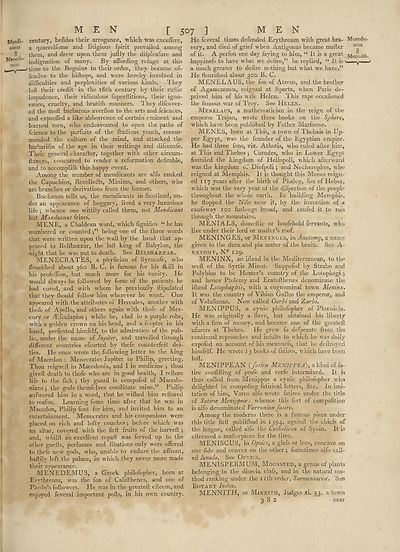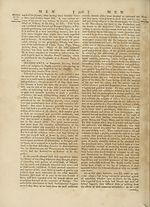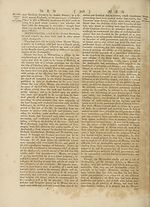Encyclopaedia Britannica, or, a Dictionary of arts, sciences, and miscellaneous literature : enlarged and improved. Illustrated with nearly six hundred engravings > Volume 13, MAT-MIC
(549) Page 507
Download files
Complete book:
Individual page:
Thumbnail gallery: Grid view | List view

MEN [ 507 ] MEN
Mendi¬
cants
Menede-
nuis.
century, befides their arrogance, which was exceffive,
a quarrelfome and litigious fpirit prevailed among
them, and drew upon them juftly the difpleafure and
indignation of many. By affording refuge at this
time to the Beguins in their order, they became of-
fenfive to the bilhops, and were hereby involved in
difficulties and perplexities of various kinds. They
loft their credit in the 16th century by their ruitic
impudence, their ridiculous fuperftitions, their igno¬
rance, cruelty, and brutifh manners. They difeover-
ed the moft barbarous averfton to the arts and fciences,
and exprelfed a like abhorrence of certain eminent and
learned men, who endeavoured to open the paths of
fcience to the purfuits of the ftudious youth, recom¬
mended the culture of the mind, and attacked the
barbarifm of the age in their writings and difeourfe.
Their general charafter, together with other circum-
ftances, concurred to render a reformation defirable,
and to accomplilh this happy event.
Among the number of mendicants are alfo ranked
the Capuchins, Recollefts, Minims, and others, who
are branches or derivations from the former.
Buchanan tells us, the mendicants in Scotland, un¬
der an appearance of beggary, lived a very luxurious
life ; whence one wittily called them, not Mendicant
but Manducant friars.
MENE, a Chaldean word, which fignifies “ he has
numbered or counted j” being one of the three words
that were written upon the wall by the hand that ap¬
peared to Belffiazzar, the laft king of Babylon, the
night that he was put to death. See Belshazzar.
MENECRATES, a phyfician of Syracufe, who
flourilhed about 360 B. C. is famous for his Ikill in
his profeffion, but much more for his vanity. He
would always be followed by fome of the patients he
had cured, and with whom he previoufly ftipulated
that they ffiould follow him wherever he went. One
appeared with the attributes of Hercules, another with
thofe of Apollo, and others again with thofe of Mer¬
cury or fEfculapius ■, while he, clad in a purple robe,
with a golden crown on his head, and a feeptre in his
hand, prefented himfelf, to the admiration of the pub¬
lic, under the name of Jupiter, and travelled through
different countries efcorted by thefe counterfeit dei¬
ties. He once wrote the following letter to the king
of Macedon : Menecrates Jupiter to Philip, greeting.
Thou reigneft in Macedonia, and I in medicine } thou
giveft death to thofe Avho are in good health, I reftore
life to the ftek ; thy guard is compofed of Macedo¬
nians ; the gods themfelves conftitute mine.” Philip
anfwered him in a word, that he wiffied him reftored
to reafon. Learning fome time after that he was in
Macedon, Philip font for him, and invited him to an
entertainment. Menecrates and his companions were
placed on rich and lofty couches; before which was
an altar, covered with the firft fruits of the harveft •,
and, whilft an excellent repaft was ferved up to the
other guefts, perfumes and libations only were offered
to thefe new gods, who, unable to endure the affront,
haftily left the palace, in which they never more made
their appearance.
MENEDEMUS, a Greek philofopher, born at
Erythreum, was the fon of Califthenes, and one of
Phedo’s followers. He was in the greateft efteem, and
enjoyed feveral important polls, in his own country.
He feveral times defended Erythreum with great bra- Menedc-
very, and died of grief when Antigonus became mailer n:|u
of it. A perfon one day faying to him, “ It is a great
happinefs to have what we delire,” he replied, “ It is u—
a much greater to defire nothing but what we have.”
He flourilhed about 300 B. C.
MENELAUS, the fon of Atreus, and the brother
of Agamemnon, reigned at Sparta, when Paris de¬
prived him of his wife Helen. This rape occafioned
the famous Avar of Troy. See Helen.
Menelaus, a mathematician in the reign of the
emperor Trajan, Avrote three books on the Sphere,
Avhich have been publilhed by Father Marfenne.
MENES, born at This, a toAvn of Thebais in Up¬
per Egypt, was the founder of the Egyptian empire.
He had three fons, viz. Athotis, avIio ruled after him,
at This and Thebes ; Curudes, Avho in LoAver Egypt
founded the kingdom of Heliopoli, Avhich afterward
was the kingdom of Diofpoli *, and Necherophes, who
reigned at Memphis. It is thought this Menes reign--
ed 117 years after the birth of Phaleg, fon of Heber,
wffiich was the Arery year of the difperiion of the people
throughout the Avliole earth. In building Memphis,
he Hopped the Nile near it, by the invention of a
caufeAvay 100 furlongs broad, and caufed it to run
through the mountains.
MENIALS, domellic or houfehold fervants, Avho
live under their lord or mailer’s roof.
MENINGES, or Menynges, in Anatomy, a name
given to the dura and pia mater of the brain. See A-
NATOMY, NP 129.
MENINX, an illand in the Mediterranean, to the
AA'eft of the Syrtis Minor. 'Suppofed by Strabo and
Polybius to be Homer’s country of the Lotophagi j
and hence Ptolemy and Eratofthenes denominate the
illand Lotophagitis, Avith a cognominal town Meninx.
It Avas the country of Vibius Gallus the emperor, and
of Volufianus. Noav called Gerbi and 'Zarbu
MENIPPUS, a cynic philofopher of Phoenicia.
He Avas originally a Have, but obtained his liberty
Avith a fum of money, and became one of the greateft
ufurers at Thebes. He greAV fo defperate from the
continual reproaches and infults to Avhich he Avas daily
expofed on account of his meannefs, that he deftroyed
himfelf. He Avrute 13 books of fatires, Avhich ha\Te been
loft.
MENIPPEAN (fatira MeniPPEA), a kind of fa-
tire confifting of profe and verfe intermixed. It is
thus called from Menippus a cynic plnlofopher Avho
delighted in compofing fatirical letters, &c. In imi¬
tation of him, Varro alfo wrrote fatires under the title
of Satires Menippece: whence this fort of compofition
is alfo denominated Varroman fatirc.
Among the moderns there is a famous piece under
this title firil publilhod in 1594, againft the chiefs of
the league, called alfo the Catholicon of Spain. It is
efteemed a mafterpiece for the time.
MENISCUS, in Optics, a glafs or lens, concave on
one fide and convex on the other } fometimes aifo call¬
ed lunula. See Optics.
MENISPERMUM, Moonseed, a genus of plants
belonging to the dioecia clafs, and in the natural me¬
thod ranking under the nth order, Sarmentacecs. See
Botany Index.
MENNITH, or Minnith, Judges xi. 33. a toAvn
3 S 2 near
Mendi¬
cants
Menede-
nuis.
century, befides their arrogance, which was exceffive,
a quarrelfome and litigious fpirit prevailed among
them, and drew upon them juftly the difpleafure and
indignation of many. By affording refuge at this
time to the Beguins in their order, they became of-
fenfive to the bilhops, and were hereby involved in
difficulties and perplexities of various kinds. They
loft their credit in the 16th century by their ruitic
impudence, their ridiculous fuperftitions, their igno¬
rance, cruelty, and brutifh manners. They difeover-
ed the moft barbarous averfton to the arts and fciences,
and exprelfed a like abhorrence of certain eminent and
learned men, who endeavoured to open the paths of
fcience to the purfuits of the ftudious youth, recom¬
mended the culture of the mind, and attacked the
barbarifm of the age in their writings and difeourfe.
Their general charafter, together with other circum-
ftances, concurred to render a reformation defirable,
and to accomplilh this happy event.
Among the number of mendicants are alfo ranked
the Capuchins, Recollefts, Minims, and others, who
are branches or derivations from the former.
Buchanan tells us, the mendicants in Scotland, un¬
der an appearance of beggary, lived a very luxurious
life ; whence one wittily called them, not Mendicant
but Manducant friars.
MENE, a Chaldean word, which fignifies “ he has
numbered or counted j” being one of the three words
that were written upon the wall by the hand that ap¬
peared to Belffiazzar, the laft king of Babylon, the
night that he was put to death. See Belshazzar.
MENECRATES, a phyfician of Syracufe, who
flourilhed about 360 B. C. is famous for his Ikill in
his profeffion, but much more for his vanity. He
would always be followed by fome of the patients he
had cured, and with whom he previoufly ftipulated
that they ffiould follow him wherever he went. One
appeared with the attributes of Hercules, another with
thofe of Apollo, and others again with thofe of Mer¬
cury or fEfculapius ■, while he, clad in a purple robe,
with a golden crown on his head, and a feeptre in his
hand, prefented himfelf, to the admiration of the pub¬
lic, under the name of Jupiter, and travelled through
different countries efcorted by thefe counterfeit dei¬
ties. He once wrote the following letter to the king
of Macedon : Menecrates Jupiter to Philip, greeting.
Thou reigneft in Macedonia, and I in medicine } thou
giveft death to thofe Avho are in good health, I reftore
life to the ftek ; thy guard is compofed of Macedo¬
nians ; the gods themfelves conftitute mine.” Philip
anfwered him in a word, that he wiffied him reftored
to reafon. Learning fome time after that he was in
Macedon, Philip font for him, and invited him to an
entertainment. Menecrates and his companions were
placed on rich and lofty couches; before which was
an altar, covered with the firft fruits of the harveft •,
and, whilft an excellent repaft was ferved up to the
other guefts, perfumes and libations only were offered
to thefe new gods, who, unable to endure the affront,
haftily left the palace, in which they never more made
their appearance.
MENEDEMUS, a Greek philofopher, born at
Erythreum, was the fon of Califthenes, and one of
Phedo’s followers. He was in the greateft efteem, and
enjoyed feveral important polls, in his own country.
He feveral times defended Erythreum with great bra- Menedc-
very, and died of grief when Antigonus became mailer n:|u
of it. A perfon one day faying to him, “ It is a great
happinefs to have what we delire,” he replied, “ It is u—
a much greater to defire nothing but what we have.”
He flourilhed about 300 B. C.
MENELAUS, the fon of Atreus, and the brother
of Agamemnon, reigned at Sparta, when Paris de¬
prived him of his wife Helen. This rape occafioned
the famous Avar of Troy. See Helen.
Menelaus, a mathematician in the reign of the
emperor Trajan, Avrote three books on the Sphere,
Avhich have been publilhed by Father Marfenne.
MENES, born at This, a toAvn of Thebais in Up¬
per Egypt, was the founder of the Egyptian empire.
He had three fons, viz. Athotis, avIio ruled after him,
at This and Thebes ; Curudes, Avho in LoAver Egypt
founded the kingdom of Heliopoli, Avhich afterward
was the kingdom of Diofpoli *, and Necherophes, who
reigned at Memphis. It is thought this Menes reign--
ed 117 years after the birth of Phaleg, fon of Heber,
wffiich was the Arery year of the difperiion of the people
throughout the Avliole earth. In building Memphis,
he Hopped the Nile near it, by the invention of a
caufeAvay 100 furlongs broad, and caufed it to run
through the mountains.
MENIALS, domellic or houfehold fervants, Avho
live under their lord or mailer’s roof.
MENINGES, or Menynges, in Anatomy, a name
given to the dura and pia mater of the brain. See A-
NATOMY, NP 129.
MENINX, an illand in the Mediterranean, to the
AA'eft of the Syrtis Minor. 'Suppofed by Strabo and
Polybius to be Homer’s country of the Lotophagi j
and hence Ptolemy and Eratofthenes denominate the
illand Lotophagitis, Avith a cognominal town Meninx.
It Avas the country of Vibius Gallus the emperor, and
of Volufianus. Noav called Gerbi and 'Zarbu
MENIPPUS, a cynic philofopher of Phoenicia.
He Avas originally a Have, but obtained his liberty
Avith a fum of money, and became one of the greateft
ufurers at Thebes. He greAV fo defperate from the
continual reproaches and infults to Avhich he Avas daily
expofed on account of his meannefs, that he deftroyed
himfelf. He Avrute 13 books of fatires, Avhich ha\Te been
loft.
MENIPPEAN (fatira MeniPPEA), a kind of fa-
tire confifting of profe and verfe intermixed. It is
thus called from Menippus a cynic plnlofopher Avho
delighted in compofing fatirical letters, &c. In imi¬
tation of him, Varro alfo wrrote fatires under the title
of Satires Menippece: whence this fort of compofition
is alfo denominated Varroman fatirc.
Among the moderns there is a famous piece under
this title firil publilhod in 1594, againft the chiefs of
the league, called alfo the Catholicon of Spain. It is
efteemed a mafterpiece for the time.
MENISCUS, in Optics, a glafs or lens, concave on
one fide and convex on the other } fometimes aifo call¬
ed lunula. See Optics.
MENISPERMUM, Moonseed, a genus of plants
belonging to the dioecia clafs, and in the natural me¬
thod ranking under the nth order, Sarmentacecs. See
Botany Index.
MENNITH, or Minnith, Judges xi. 33. a toAvn
3 S 2 near
Set display mode to:
![]() Universal Viewer |
Universal Viewer | ![]() Mirador |
Large image | Transcription
Mirador |
Large image | Transcription
Images and transcriptions on this page, including medium image downloads, may be used under the Creative Commons Attribution 4.0 International Licence unless otherwise stated. ![]()
| Permanent URL | https://digital.nls.uk/192668299 |
|---|
| Attribution and copyright: |
|
|---|
| Description | Ten editions of 'Encyclopaedia Britannica', issued from 1768-1903, in 231 volumes. Originally issued in 100 weekly parts (3 volumes) between 1768 and 1771 by publishers: Colin Macfarquhar and Andrew Bell (Edinburgh); editor: William Smellie: engraver: Andrew Bell. Expanded editions in the 19th century featured more volumes and contributions from leading experts in their fields. Managed and published in Edinburgh up to the 9th edition (25 volumes, from 1875-1889); the 10th edition (1902-1903) re-issued the 9th edition, with 11 supplementary volumes. |
|---|---|
| Additional NLS resources: |
|

